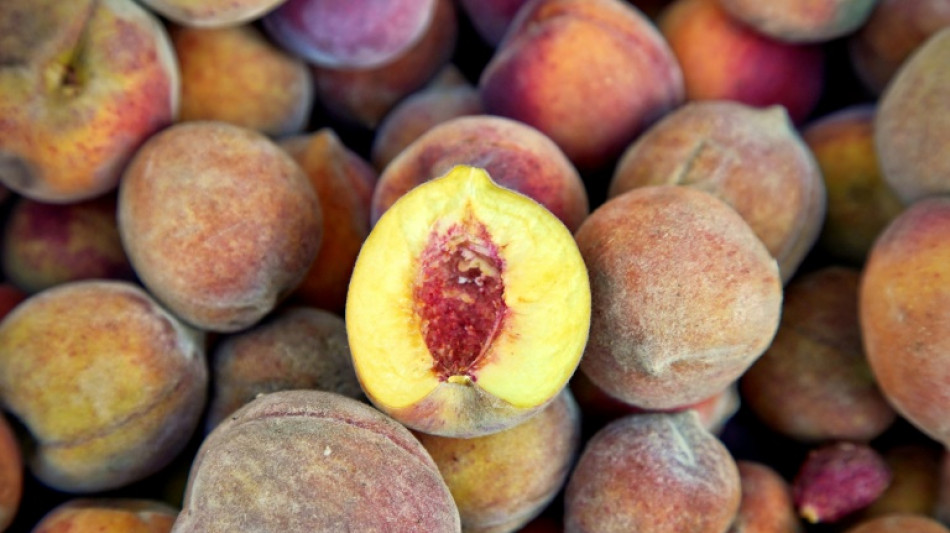
-
 Hodge edges towards century as West Indies 310-4, trail by 265
Hodge edges towards century as West Indies 310-4, trail by 265
-
US Afghans in limbo after Washington soldier attack

-
 England lose Duckett in chase of record 435 to keep Ashes alive
England lose Duckett in chase of record 435 to keep Ashes alive
-
Australia all out for 349, set England 435 to win 3rd Ashes Test

-
 US strikes over 70 IS targets in Syria after attack on troops
US strikes over 70 IS targets in Syria after attack on troops
-
Australian lifeguards fall silent for Bondi Beach victims

-
 Trump's name added to Kennedy Center facade, a day after change
Trump's name added to Kennedy Center facade, a day after change
-
West Indies 206-2, trail by 369, after Duffy's double strike

-
 US strikes Islamic State group in Syria after deadly attack on troops
US strikes Islamic State group in Syria after deadly attack on troops
-
Epstein files opened: famous faces, many blacked-out pages

-
 Ravens face 'special' Patriots clash as playoffs come into focus
Ravens face 'special' Patriots clash as playoffs come into focus
-
Newly released Epstein files: what we know

-
 Musk wins US court appeal of $56 bn Tesla pay package
Musk wins US court appeal of $56 bn Tesla pay package
-
US judge voids murder conviction in Jam Master Jay killing

-
 Trump doesn't rule out war with Venezuela
Trump doesn't rule out war with Venezuela
-
Haller, Aouar out of AFCON, Zambia coach drama

-
 Nasdaq rallies again while yen falls despite BOJ rate hike
Nasdaq rallies again while yen falls despite BOJ rate hike
-
Bologna win shoot-out with Inter to reach Italian Super Cup final

-
 Brandt and Beier send Dortmund second in Bundesliga
Brandt and Beier send Dortmund second in Bundesliga
-
Trump administration begins release of Epstein files

-
 UN Security Council votes to extend DR Congo mission by one year
UN Security Council votes to extend DR Congo mission by one year
-
Family of Angels pitcher, club settle case over 2019 death

-
 US university killer's mystery motive sought after suicide
US university killer's mystery motive sought after suicide
-
Rubio says won't force deal on Ukraine as Europeans join Miami talks

-
 Burkinabe teen behind viral French 'coup' video has no regrets
Burkinabe teen behind viral French 'coup' video has no regrets
-
Brazil court rejects new Bolsonaro appeal against coup conviction

-
 Three-time Grand Slam winner Wawrinka to retire in 2026
Three-time Grand Slam winner Wawrinka to retire in 2026
-
Man Utd can fight for Premier League title in next few years: Amorim

-
 Pandya blitz powers India to T20 series win over South Africa
Pandya blitz powers India to T20 series win over South Africa
-
Misinformation complicated Brown University shooting probe: police

-
 IMF approves $206 mn aid to Sri Lanka after Cyclone Ditwah
IMF approves $206 mn aid to Sri Lanka after Cyclone Ditwah
-
Stocks advance as markets cheer weak inflation

-
 Emery says rising expectations driving red-hot Villa
Emery says rising expectations driving red-hot Villa
-
Three killed in Taipei metro attacks, suspect dead

-
 Seven Colombian soldiers killed in guerrilla attack: army
Seven Colombian soldiers killed in guerrilla attack: army
-
Amorim takes aim at Man Utd youth stars over 'entitlement'

-
 Mercosur meets in Brazil, EU eyes January 12 trade deal
Mercosur meets in Brazil, EU eyes January 12 trade deal
-
US Fed official says no urgency to cut rates, flags distorted data

-
 Rome to charge visitors for access to Trevi Fountain
Rome to charge visitors for access to Trevi Fountain
-
Spurs 'not a quick fix' for under-fire Frank

-
 Poland president accuses Ukraine of not appreciating war support
Poland president accuses Ukraine of not appreciating war support
-
Stocks advance with focus on central banks, tech

-
 Amorim unfazed by 'Free Mainoo' T-shirt ahead of Villa clash
Amorim unfazed by 'Free Mainoo' T-shirt ahead of Villa clash
-
PSG penalty hero Safonov ended Intercontinental win with broken hand

-
 French court rejects Shein suspension
French court rejects Shein suspension
-
'It's so much fun,' says Vonn as she milks her comeback

-
 Moscow intent on pressing on in Ukraine: Putin
Moscow intent on pressing on in Ukraine: Putin
-
UN declares famine over in Gaza, says 'situation remains critical'

-
 Guardiola 'excited' by Man City future, not pondering exit
Guardiola 'excited' by Man City future, not pondering exit
-
Czechs name veteran coach Koubek for World Cup play-offs


As climate changes, farms in US 'Peach State' Georgia suffer
From a distance, everything looks normal: neat rows of peach trees, their green leaves fluttering in the wind, near a pretty little American farmhouse.
But Georgia farmer Stuart Gregg searched in vain among the branches, unable to find a single piece of fruit.
"We have no harvest this year," he said.
Gregg's prized peaches, like those on farms across Georgia, have been decimated, a rare event for the southern state that is so closely associated with the fruit that it is nicknamed the "Peach State."
Last winter was unusually mild, causing peach blossoms to bloom early. But then in March, temperatures dropped below freezing, far too cold for the delicate buds.
"When we started checking that, one peach blossom open, dead, one peach blossom open, dead. We hate to see that," Gregg told AFP.
Just three days of frost was enough to kill off the entire crop.
Of the approximately 70 acres (28 hectares) cultivated by Gregg Farms, a family operation in Concord, a handful of fallen pits are all Gregg has to show for this season's harvest.
Unprecedented in 20 years, it is a "six-figure" loss, he said.
Reluctantly, the family decided not to open their fields this summer to customers, who usually come to pick peaches or enjoy ice cream. At the farm's entrance, a large red sign invites them to come back "in 2024."
- Ninety percent loss -
This year, around 90 percent of the peach harvest in the state has been lost, experts say. They warn that this will happen more often due to climate change.
Eventually, some types of peaches that need a cold winter "will not be able to be grown in Georgia at all," said Pam Knox, an agricultural climatologist at the University of Georgia.
The sweet and juicy fruit has long been an institution in the state.
"Nothing beats a Georgia peach," Gregg said proudly. The peach appears on license plates, on restaurant menus, just about everywhere -- except, this year, on peach trees.
To help local producers, Dario Chavez, a horticulture professor specializing in peaches, is developing new hybrid varieties better adapted to mild winters.
"You basically do matchmaking," said the scientist who lives, appropriately enough, in Peachtree City.
In his laboratory and in the University of Georgia's orchard, he can cross species chosen for their delicious taste, their good yield or their adaptation to warmer climates.
Chavez, 39, works with farmers who are "not afraid of change," he said.
But the process is slow. "The things that we do today, it may take them 15 years to see the light."
In the meantime, some farmers have begun growing fruits that were previously grown only further south, such as citrus fruits.
"As time goes on, and we get warmer in Georgia, they're experimenting with more varieties, like grapefruits and even some oranges," said Knox.
- Blueberries at risk, too -
But climate change isn't just a threat to peaches.
Blueberries are also important in Georgia, and they, too, are suffering.
Gregg and his family, who grow them alongside their peach trees, have lost around 75 percent of their blueberries this year.
"Before, we always had a lot of blueberries. And in the last two or three years, not really," he said, sweeping the few small purple berries still on the shrubs with his hand.
The young farmer, whose grandparents established the farm in the 1970s, prefers not to comment on the reasons the 2023 season has been so disastrous.
"We are not really scientists," he said. "I can't really worry about climate change, whether it's going to happen or not. We're doing what we can."
If a more resistant fruit is developed, he would be happy to try growing it.
In the meantime, his thoughts turn to next summer, which he imagines as rich in ripe peaches and delighted customers, and the smile returns to his lips.
Bad harvests are part of a farmer's life, Gregg reminded himself.
"You know, gambling and farming are about the same thing," he said. "It's just a crapshoot every year."
M.Thompson--AMWN


